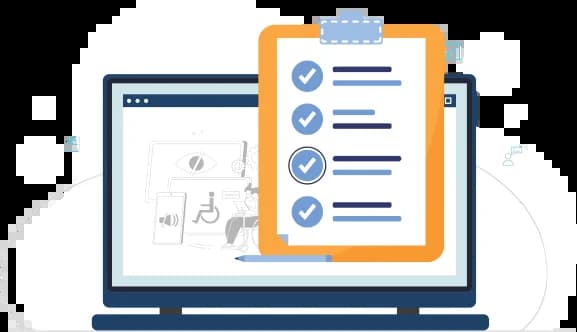Website Accessibility Checklist

Here's A Checklist To Perform Accessibility Testing
Ensure all functionality can be accessed and operated using a keyboard alone, without relying on mouse or touch interactions. Verify that keyboard focus is visible and moves in a logical order through interactive elements.
Test with popular screen readers like JAWS, NVDA, or VoiceOver to ensure proper reading and navigation of content. Check that all interactive elements, labels, and instructions are read correctly.
Verify that all non-text content (images, icons, graphs) have appropriate alternative text (alt text) descriptions. Ensure alt text conveys the purpose and meaning of the image without relying solely on visual context.
Check that headings are used correctly and in a logical hierarchical order (h1, h2, h3, etc.). Ensure headings are descriptive and reflect the content's structure.
Assess text and background color combinations to ensure sufficient contrast for readability. Verify that text is distinguishable when viewed in grayscale or when color is absent.
Ensure forms have proper labels and instructions associated with input fields. Verify that error messages and validation notifications are conveyed clearly to all users.

Check that interactive elements, such as buttons and links, have clear visual indications of focus and active states. Ensure users can understand which element is currently active or selected.
Test the application's behavior when the font size is increased or when the page is zoomed. Verify that content and functionality remain usable and do not break at different zoom levels.
Confirm that the site or application can be navigated using appropriate landmarks (e.g., headings, ARIA roles). Check that links have descriptive text and make sense out of context.
Verify that audio and video content have captions, transcripts, or audio descriptions for users with hearing or visual impairments. Test that multimedia controls are accessible and operable.
Ensure that text is readable and legible, with appropriate font sizes, line spacing, and letter spacing. Verify that content is organized with proper headings, paragraphs, and lists.
Test the application on various browsers, devices, and operating systems to ensure consistent accessibility. Verify compatibility with assistive technologies commonly used by individuals with disabilities.

Remember, this checklist serves as a starting point, and additional accessibility considerations may be necessary based on your specific project requirements and target audience. Regular user testing and involving individuals with disabilities can provide valuable insights into improving accessibility.